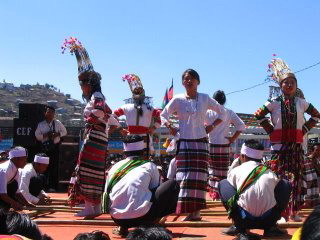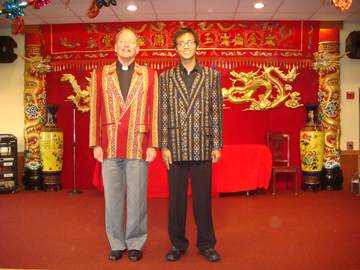The Chin in Chicago (original) (raw)
Feature Thu Feb 25 2010
On Sundays, after the main service at the First Free Church in Andersonville has ended and the congregants have filed out and made their ways home down Ashland, or to brunch somewhere on Clark, a smaller congregation files in. They make their way down mostly from the north, from Albany Park and Rogers Park and Edgewater, where they move anonymously among the swarms of Asian immigrants, pushed between the embrace of something universal and the isolation of anonymity. A grinning, thin-framed boy of 17 named Ha Tha Thing hands an outline of the week's service to each as they stream in, one page of printed paper folded back on itself like a book jacket.
This is where the congregation of the Chin Baptist Church of Chicago--in all, about 70 or so of the 150 Chin living in Chicago, Christians of a variety of denominations that fled forced labor and religious discrimination in Burma--meet (under the Baptist banner for the sake of cultural unity and preservation) to praise the Lord. Conspicuously among them this past Sunday was a reporter, whom Ha Tha welcomed as he would anyone, with a smile and a handshake, then walked him down the chapel's aisle insisting he sit in the front row. This was the service following Chin National Day--February 20, the date the Chin people established democracy in the far western frontiers of Burma, though it's been largely ignored by the ruling military junta.

Chin National Day celebrated in Haka, capital of Chin State, February, 2007. (Photo: myatthura.blogspot.com)
The Andersonville chapel is a warm room of tall, off-white walls and stained glass; color-splattered cloth drapes down from the ceiling along the wall behind the altar, and the pillars and chairs are made of aged wood. The chairs squeal and creak when the congregation rises in recitation, and their chant has in the open room a hearty resonance. The Chin are actually a diverse group of tribes with varying relation to one another, all with specific customs and dialects, and while the reporter in the front row on Sunday understood none such dialects, he fell easily into the rhythmic spell of the sermon; language's inherent rhythms are always clearer where words are not.
The story of Chin Christianity begins in British-colonized Chinland, where a missionary named Arthur Carson opened with his wife Laura a mission in 1899--a date the devout see as the most significant in Chin history, akin to the American Revolution here, or the Enlightenment to the West. It began a wave of Chin movement from animism towards the varying Christian sects that would spring up throughout the area.
Pastor Danny Bawi is surprisingly young to lead the sermon, and a wiry frame and baby face make it all the more noticeable. But immediately more noticeable is the assurance with which he delivers the sermon--with the confidence of a lifetime of knowing--starkly pronounced in a 24-year-old. He was talking about the Feeding of the 5,000, when Jesus fed a hungry, destitute multitude with two small fish and five loaves of bread. He related it to the Chin struggle, surviving hunger and danger and keeping faith. "Like Jesus broke the bread, he had to break us, but he then brought us to Chicago," he said, "and with faith, he will feed us." The reporter knew none of this at the time, but simply listened to the rhythm of the sermon.

Pastor Danny Bawi (right) with a friend
Britain left Burma in 1948 to the Burman ethnic majority, leaving in its wake arbitrary lines that turned Chinland into the Chin state of Burma. In 1966 the Buddhist, Burman-ruled government kicked U.S. missionaries out, though the faith remained. Bawi was working in a forced labor camp for the Burmese army in 1997, when he was 12, carrying on his light frame fifty-pound packs of artillery. He remembers carrying them past exhaustion, specific instances like flashes of a photograph: falling to the ground and passing out; militiamen kicking and punching him, beating him with a stick. He went to a Christian summer camp that same year where something dramatic happened. God spoke to him through a passage in the book of Luke. It was about a wicked tax collector who is saved by the grace of god. And so there was time and room for anybody's soul to be saved. His faith immediately became stronger, and he began to believe in the salvation of not just himself but his oppressors too.
When he was old enough, Bawi left home for the Myanmar Institute of Theology in Rangoon to study the word of God. In Rangoon his faith deepened but the harassment worsened. He was routinely beaten on the street. He was held up by police officers, who would demand his watch, or his rings, or the little money he had. He recited to himself the story in the book of Luke, and forgave them. He wanted to spread the word of God on the streets of Rangoon, to save the souls of his oppressors, but when he spoke of Christ to non-Christians he was arrested. He spent 72 hours in prison, where he was beaten with metal pipes and hung from the ceiling upside down for hours on end. Still, the most abhorrent violations he can't speak of.
For a year he continued as a pastor, and for a year police came to his house and asked for bribes, threatening to put him on house arrest, or worse, send him back to prison. When he had nothing left to offer for his freedom he fled. He sold what he had and solicited loans from teachers, pastors and family. It cost about $1,200 to pay an agent--much like a coyote--to smuggle him out of the country.
He was stuffed with 17 people into a small van and smuggled through Thailand. The struggle for space and air to breath in the van was so severe that a friend died, still sitting upright against him.
In Thailand the group spent three days and three nights in the woods with no food or water. The agents stressed the importance of keeping quiet, because if the suspicion of Thai authorities were aroused they would all be arrested. When the babies in the group would let out a wail an agent would hit the mother, telling her if she couldn't keep the baby quiet she would be tied and left behind with it.
The trip from Thailand to Malaysia was by way of the sea. In small, rickety boats made for transporting produce they were stuffed in pairs, lying on the floor and covered--now weak and hungry--with heavy bags of rice and flour. Thousands of Burmese have drowned or died otherwise making the same voyage.
They met contacts at port who took them to the capitol, Kuala Lampur, where they were dropped off with no legal documentation, no right to work or to rent housing. It was little better than Rangoon, though they were free to worship and the United Nations had refugee offices there. The next year was spent praying and struggling to attain refugee status and, finally, placement in the United States. For every step of the way, Bawi insists that others have had it worse; he is alive.
The reporter knew none of this at the time; still, he listened simply to the rhythm of the sermon. It broke in and out of song, folk-like ballads with congregants coming up to sing or play guitar. The songs mostly thank and praise God. A summation of one of the more popular hymns goes something like: "God gives us many blessings in this life and gave his only begotten son for us. We can take difficulty and hardship for him."
When the sermon was over, Bawi came down and shook the reporter's hand and welcomed him, a wide grin spread across his face the whole time. A trickle of congregants followed suite, all smiling wildly. The congregation shuffled out and had soon gone home like the one before it, and the reporter followed behind, crossing Ashland for a #9 bus, and though still not himself a believer, he rode the bus home tingling and high on the faith of others.
Listen to Pastor Bawi speak over Chin church music:
This feature is supported in part by a Community News Matters grant from The Chicago Community Trust and the John S. and James L. Knight Foundation.
